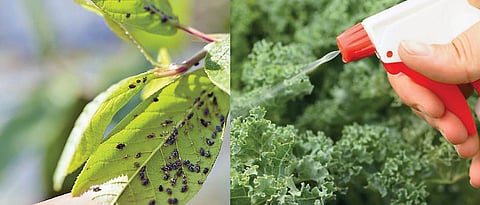

This is the perfect season for pests and insects to multiply in your garden. Here’s how you can tackle them.
Monsoon transforms the landscape and the earthy hues turn shades of inviting green. Leaves, plants, shrubs and bushes all wear a fresh, sprightly new look. But along with the rains and slush, come the rodents.
The wet, mushy soil, is perfect breeding spot for the insects and the warm, humid climate makes it all the more conducive for breeding.
Vaibhav Dugar, founder of ek titli.org says, “You have to be persistent when it comes to tackling pests and insects in the monsoon. The rains wash away everything, so you have to keep repeating the process. While spraying organic and homemade sprays on the plants and leaves, ensure that you are not harming good insects — like earthworms, for instance.”
He doesn’t believe in using chemical pesticides, because they end up harming the plants, directly and indirectly. So how do you tackle the pests and make your green corner pest-free? Here’s how...
Fight with neem
Neem oil is best for soil. To make the spray, add four-five drops of oil to 1 litre water. Mix it and spray them on all the leaves, especially the undersides, where insects are likely to hide.
“Once the solution is made, it should be used as quickly as possible, because when mixed with water, the neem oil starts breaking down. When you are using it for the first time, thoroughly drench all leaves and the soil around the plant. If it rains after spraying, then repeat the process,” explains Dugar.
If you are worried that the plants might be a little sensitive to the solution, spray it in a small area of the plant, wait for a day or two, and see what happens. If you are dealing with a less sensitive insect species, you may need to increase the concentration of the neem spray.
Go Garlic
Garlic is a completely organic, green solution and poses no serious health risks to anyone in the household. Crush the garlic pods, boil them in water, strain and then fill it in the bottle. A garlic spray can be used to control insects like aphids, ants, beetles, borers caterpillars, termites and whiteflies.
“It can be sprayed on any plant, flower, fruit, vegetable or herbs to repel pests. Spray it on the plant once a week or twice if it’s raining in abundance. Garlic oil can also be used to control a number of different insects,” adds Dugar.
Mulching
Mulching is mainly used for covering the topsoil with leaves, grass, twigs, crop residues, etc. As the mulch material decomposes, it increases the content of organic matter in the soil. “Mulching is mainly used for feeding and protecting soil organisms and provides nutrients to the crops. It also assists in evaporation of water,” points out Dugar.
Chilli power
By planting green chillies in your garden, you can ward off most of the pests. So all you need to do is plant a chilli sapling in fertile soil and if planting in pots, make sure to use organic compost which gives the same effect as a well-drained fertile soil.
Cure with Cow Dung
Subhash Tayade, a gardener working in the Pimpri Chinchwad area, suggests using cow dung to reduce the chances of it being attacked by insects.
Says he, “Take up the cleaning and maintenance of your garden in the monsoon. This will ensure that the number of attacking insects goes down.”
Besides, cow dung when turned into compost and manure, becomes a nutrient-rich fertiliser. “Cow manure will also add generous amounts of organic matter to your soil. It also boosts the growth of garden plants. It can be mixed into the soil or used as top dressing,”
he adds.
